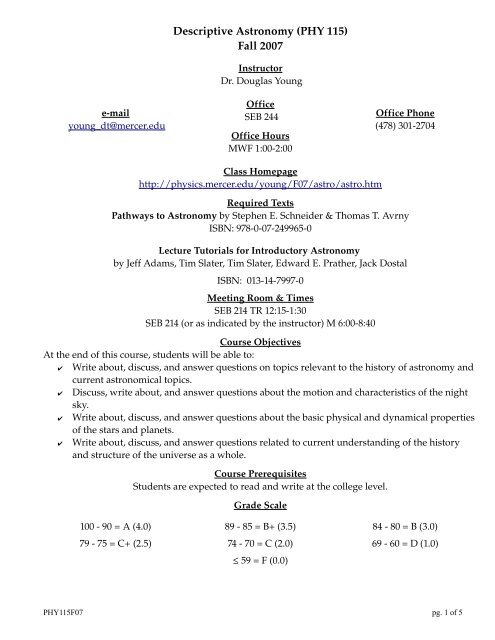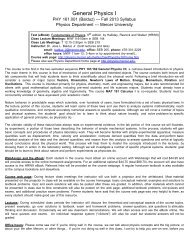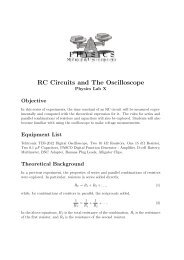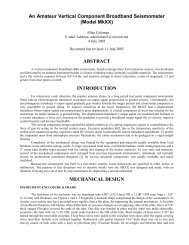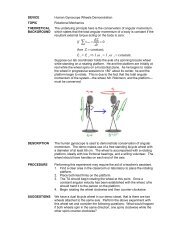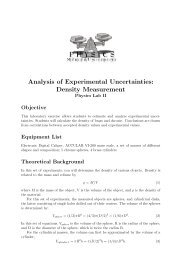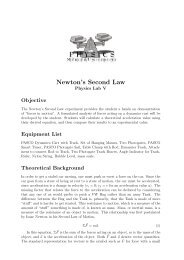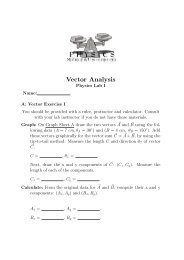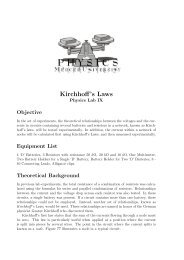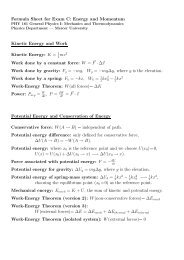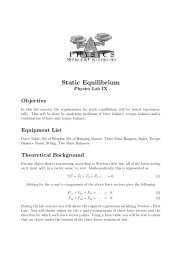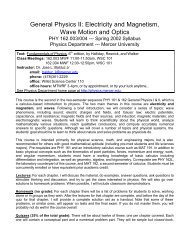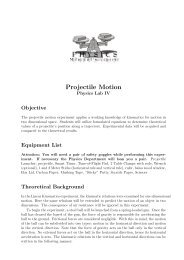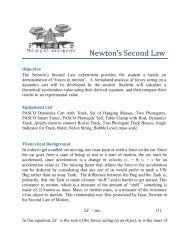PHY 115 - the Mercer University Physics Homepage
PHY 115 - the Mercer University Physics Homepage
PHY 115 - the Mercer University Physics Homepage
Create successful ePaper yourself
Turn your PDF publications into a flip-book with our unique Google optimized e-Paper software.
email<br />
young_dt@mercer.edu<br />
Descriptive Astronomy (<strong>PHY</strong> <strong>115</strong>)<br />
Fall 2007<br />
Instructor<br />
Dr. Douglas Young<br />
Office<br />
SEB 244<br />
Office Hours<br />
MWF 1:002:00<br />
Office Phone<br />
(478) 3012704<br />
Class <strong>Homepage</strong><br />
http://physics.mercer.edu/young/F07/astro/astro.htm<br />
Required Texts<br />
Pathways to Astronomy by Stephen E. Schneider & Thomas T. Avrny<br />
ISBN: 9780072499650<br />
Lecture Tutorials for Introductory Astronomy<br />
by Jeff Adams, Tim Slater, Tim Slater, Edward E. Pra<strong>the</strong>r, Jack Dostal<br />
ISBN: 0131479970<br />
Meeting Room & Times<br />
SEB 214 TR 12:151:30<br />
SEB 214 (or as indicated by <strong>the</strong> instructor) M 6:008:40<br />
Course Objectives<br />
At <strong>the</strong> end of this course, students will be able to:<br />
✔ Write about, discuss, and answer questions on topics relevant to <strong>the</strong> history of astronomy and<br />
current astronomical topics.<br />
✔ Discuss, write about, and answer questions about <strong>the</strong> motion and characteristics of <strong>the</strong> night<br />
sky.<br />
✔ Write about, discuss, and answer questions about <strong>the</strong> basic physical and dynamical properties<br />
of <strong>the</strong> stars and planets.<br />
✔ Write about, discuss, and answer questions related to current understanding of <strong>the</strong> history<br />
and structure of <strong>the</strong> universe as a whole.<br />
Course Prerequisites<br />
Students are expected to read and write at <strong>the</strong> college level.<br />
Grade Scale<br />
100 90 = A (4.0) 89 85 = B+ (3.5) 84 80 = B (3.0)<br />
79 75 = C+ (2.5) 74 70 = C (2.0) 69 60 = D (1.0)<br />
≤ 59 = F (0.0)<br />
<strong>PHY</strong><strong>115</strong>F07 pg. 1 of 5
Grade Distribution<br />
“Lecture” = 75% / Lab = 25% of total grade<br />
“Lecture” Grade Portion Breakdown:<br />
➢ 25% [18.75% total] Daily Work/Homework<br />
➢ 25% [18.75% total] Reading Quizzes<br />
➢ 50% [37.50% total] Tests (3 Tests => 20% on highest test grade, 15% on o<strong>the</strong>r two)<br />
Reading Quizzes<br />
Short quizzes over assigned readings from <strong>the</strong> textbook will be given periodically. Assigned<br />
reading will be announced in class prior to <strong>the</strong> quiz. These quizzes will be graded<br />
on a standard 100 point grading scale. Around 10 reading quizzes may be given during <strong>the</strong><br />
semester, so each quiz should represent less than 2.0% of <strong>the</strong> total grade. This means that<br />
doing poorly on one quiz will not harm a students grade, but doing poorly on <strong>the</strong> bulk of<br />
<strong>the</strong> quizzes will. Quizzes will take between 10 to 20 minutes of class time. The lowest three<br />
reading quizzes will be dropped.<br />
Suggestions to help studying for <strong>the</strong> reading quizzes:<br />
✔<br />
✔<br />
Read through <strong>the</strong> material at least twice, with some period of time (more than 2 hours)<br />
between readings.<br />
Highlight <strong>the</strong> main sentence in each paragraph of <strong>the</strong> reading assignment, or outline <strong>the</strong><br />
reading assignment using <strong>the</strong> main sentence in each paragraph of <strong>the</strong> reading.<br />
Daily Work/Homework<br />
Daily exercises/ homework, will be graded in one of two ways.<br />
(1) Each problem will be assigned a score of a checkplus (√+= 3), check (√= 2 ), or checkminus<br />
(√=1). Assignments will typically be scored based on <strong>the</strong> effort made by <strong>the</strong> student, ra<strong>the</strong>r<br />
than purely on if <strong>the</strong> problem is right or wrong. Based on this scale, a check on an assignment<br />
is equivalent to a 100 (on a 100 point scale);<br />
Checkpluses <strong>the</strong>refore constitute a form of extracredit.<br />
(2) Daily work/Homework may also be graded on a 5 point/problem basis. Five points will<br />
be awarded for a problem with a correct, wellwritten solution. Four points will be<br />
awarded for a problem with minor errors or with <strong>the</strong> correct solution but written in a sloppy<br />
(hard to read) fashion. One to Three points will be awarded for problems that are incomplete,<br />
with <strong>the</strong> value depending on <strong>the</strong> how much progress <strong>the</strong> student has made toward a solution.<br />
In figuring <strong>the</strong> final grade, averages over 100 on this part will be scored as a 100. However, students<br />
with averages of over 100 on this part of <strong>the</strong> grade may have <strong>the</strong>ir final grades increased by 2 points<br />
if it puts <strong>the</strong> student in <strong>the</strong> next letter grade bracket.<br />
<strong>PHY</strong><strong>115</strong>F07 pg. 2 of 5
Class Policies<br />
✔<br />
✔<br />
✔<br />
✔<br />
The instructor reserves <strong>the</strong> right to modify this syllabus as deemed necessary at anytime<br />
during <strong>the</strong> semester. Emendations to <strong>the</strong> syllabus will be discussed and negotiated with<br />
students during a class period. A revised syllabus which supersedes <strong>the</strong> original document<br />
will <strong>the</strong>n be handed out in class period shortly after <strong>the</strong> discussion/negotiation in class.<br />
Revisions can be made only if all students present in <strong>the</strong> class at <strong>the</strong> time when <strong>the</strong><br />
discussion/negotiations are made agree to <strong>the</strong> revisions.<br />
Attendance in this class is extremely important. Students are responsible for all information<br />
discussed in class. Be forewarned that students with more than an occasional absence risk<br />
doing poorly. If a student knows in advance that a class will be missed, it is expected that <strong>the</strong><br />
student will discuss this with <strong>the</strong> instructor.<br />
Questions about points awarded on graded materials should be brought up as soon as <strong>the</strong>se<br />
materials are handed back to students. All grades are final four weeks after tests and quizzes<br />
have been handed back to <strong>the</strong> class. If a student is not present in class when materials are<br />
returned, <strong>the</strong> student is responsible for arranging a time to collect <strong>the</strong>ir work from <strong>the</strong><br />
instructor.<br />
Students are allowed up to three lecture class absences that will be excused by <strong>the</strong> instructor.<br />
Reading quizzes and daily work missed during <strong>the</strong>se absences will not count against <strong>the</strong><br />
student’s grade. Absences will be taken into account by averaging over three subtracted from<br />
<strong>the</strong> total number of class days. This number will <strong>the</strong>n be used to calculate <strong>the</strong> average overall<br />
daily work/homework grade. Students are expected to use <strong>the</strong>se absences for emergency<br />
situations such as deaths in families, illness, car trouble, etc.<br />
Absences excused by <strong>the</strong> Dean’s office, such as for athletes participating in competitions,<br />
musicians participating in performances, students attending conferences, etc. are not counted<br />
as part of <strong>the</strong> three allowed absences.<br />
Students are responsible for material covered in class even if <strong>the</strong>y are absent.<br />
✔<br />
✔<br />
Homework is due at <strong>the</strong> beginning of <strong>the</strong> next class period after <strong>the</strong>y are assigned. Late<br />
homework may be accepted at <strong>the</strong> discretion of <strong>the</strong> instructor, with some penalty assigned for<br />
each instance by <strong>the</strong> instructor. If <strong>the</strong> student does not attend class, or is late to class, on <strong>the</strong><br />
day <strong>the</strong> homework is due, <strong>the</strong> homework will not be accepted for credit. In o<strong>the</strong>r words, come<br />
to class even if you do not have <strong>the</strong> homework finished.<br />
The three lowest reading quiz grades will be dropped. If a student misses a class that a<br />
reading quiz was given in, it is expected that <strong>the</strong> student will use one of <strong>the</strong> dropped grades to<br />
make up for <strong>the</strong> absence.<br />
✔ Students are allow to make up unexcused absences for two lab periods by writing a three (3)<br />
singlepage, typed, papers on each lab topic missed. This paper will be double spaced, typed,<br />
with twelve (12) point font and one (1.0) inch margins. No more than two missed periods can<br />
be made up this way. All absences beyond <strong>the</strong>se two will be scored as a zero for <strong>the</strong> lab.<br />
<strong>PHY</strong><strong>115</strong>F07 pg. 3 of 5
Unexcused absences are absences not cleared by <strong>the</strong> Dean’s office. Students are expected to<br />
use <strong>the</strong>se absences for emergency situations such as deaths in families, illness, car trouble, etc.<br />
Absences excused by <strong>the</strong> Dean’s office, such as for athletes participating in competitions,<br />
musicians participating in performances, students attending conferences, etc. are not counted<br />
as part of <strong>the</strong> two unexcused absences. Excused absences will be made up by writing a three<br />
(3) singlepage, typed paper on <strong>the</strong> lab topic missed, with <strong>the</strong> same format as <strong>the</strong> unexcused<br />
absences paper.<br />
All makeup papers are due at <strong>the</strong> next lab meeting after <strong>the</strong> missed period. Students will<br />
discuss <strong>the</strong> contents of <strong>the</strong>ir paper, at least one class day before it is due, with <strong>the</strong> instructor.<br />
Papers not “cleared” in this fashion by <strong>the</strong> instructor will not be accepted.<br />
✔ Cell Phone and Pager Usage: Out of courtesy for all those enrolled in class, all cell phones and<br />
pagers must be turned off before entering any classroom, lab, or formal academic or<br />
performance event.<br />
✔<br />
Students are expected to treat each o<strong>the</strong>r courteously.<br />
As stated in <strong>the</strong> <strong>Mercer</strong> Judicial System Handbook<br />
(http://www2.mercer.edu/StudentAffairs/JShandbook.htm):<br />
“<strong>Mercer</strong> <strong>University</strong> strives to be a Community of Respect where<br />
everyone is held in mutual high regard. Because every human being is<br />
created in <strong>the</strong> image of God, each person deserves to be treated with<br />
respect and civility. Standards of conduct are based on <strong>the</strong> values of<br />
mutual respect.”<br />
Violations of this policy will be reported <strong>the</strong> <strong>the</strong> Judicial Council.<br />
Bottom Line: Be nice to each o<strong>the</strong>r. Treat o<strong>the</strong>rs as you would like for <strong>the</strong>m to treat you.<br />
✔<br />
✔<br />
The College of Liberal Art’s academic policy will be followed. The <strong>Mercer</strong> <strong>University</strong> Honor<br />
Code binds all students. Any student caught cheating will be brought before <strong>the</strong> Honor<br />
Council. Students are encouraged to discuss homework problems toge<strong>the</strong>r, but all work<br />
submitted for a grade should be <strong>the</strong> sole product of <strong>the</strong> student that submitted <strong>the</strong> work.<br />
Students with a documented disability should inform <strong>the</strong> instructor at <strong>the</strong> close of <strong>the</strong> first<br />
class meeting or as soon as possible. If you are not registered with Disability Services, <strong>the</strong><br />
instructor will refer you to <strong>the</strong> Student Support Services office for consultation regarding<br />
documentation of your disability and eligibility for accommodations under <strong>the</strong> ADA/504. In<br />
order to receive accommodations, eligible students must provide each instructor with a<br />
Faculty Accommodation Form from Disability Services. Students must return <strong>the</strong> completed<br />
and signed form to <strong>the</strong> Disability Services office on <strong>the</strong> 3rd floor of <strong>the</strong> Connell Student<br />
Center. Students with a documented disability who do not wish to use accommodations are<br />
strongly encouraged to register with Disability Services and complete a Faculty<br />
Accommodation Form each semester. For fur<strong>the</strong>r information please contact Disability<br />
Services at 3012778 or visit <strong>the</strong> website at:<br />
http://www.mercer.edu/stu_support/swd.htm<br />
<strong>PHY</strong><strong>115</strong>F07 pg. 4 of 5
<strong>PHY</strong><strong>115</strong>F07 pg. 5 of 5


